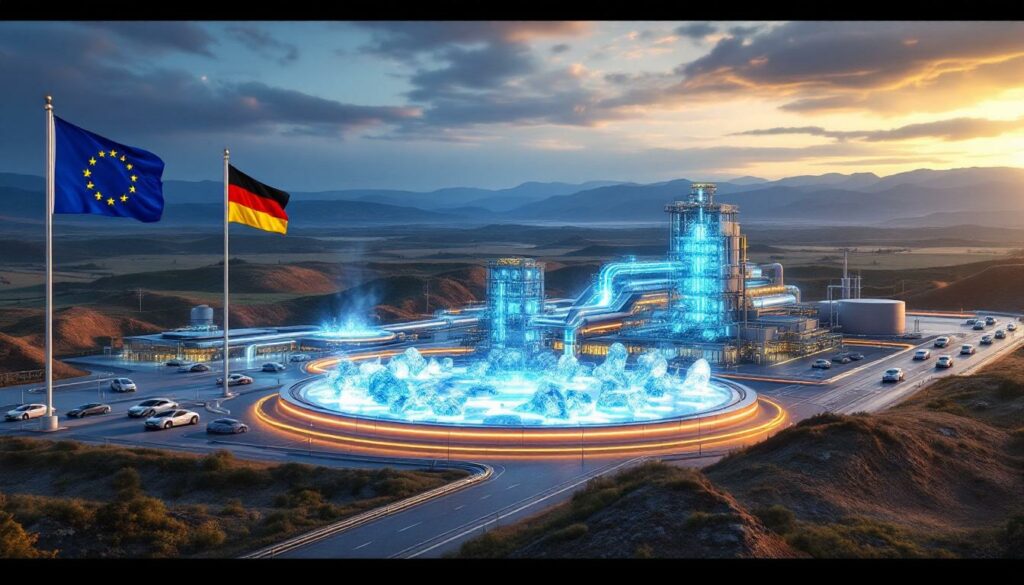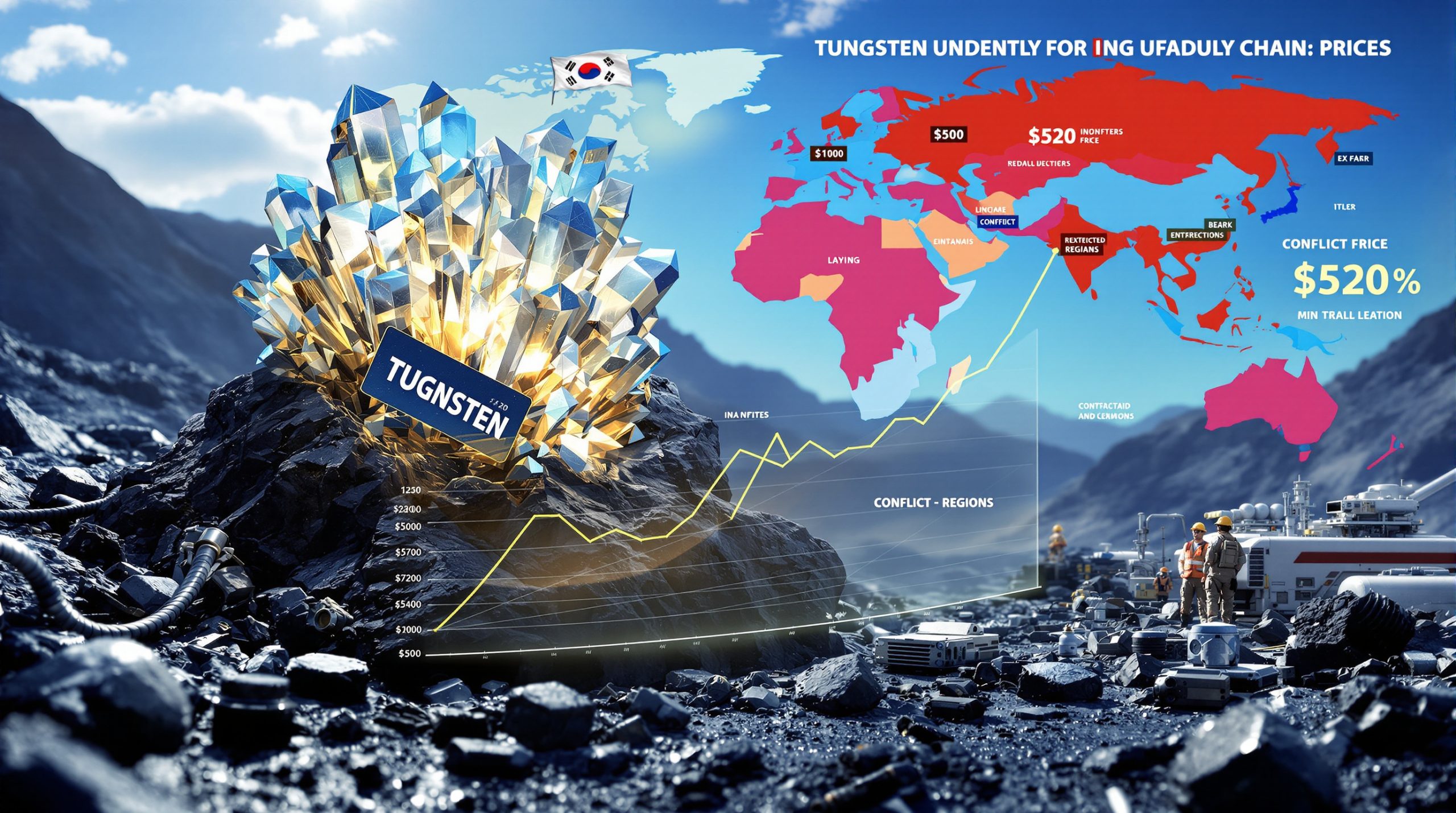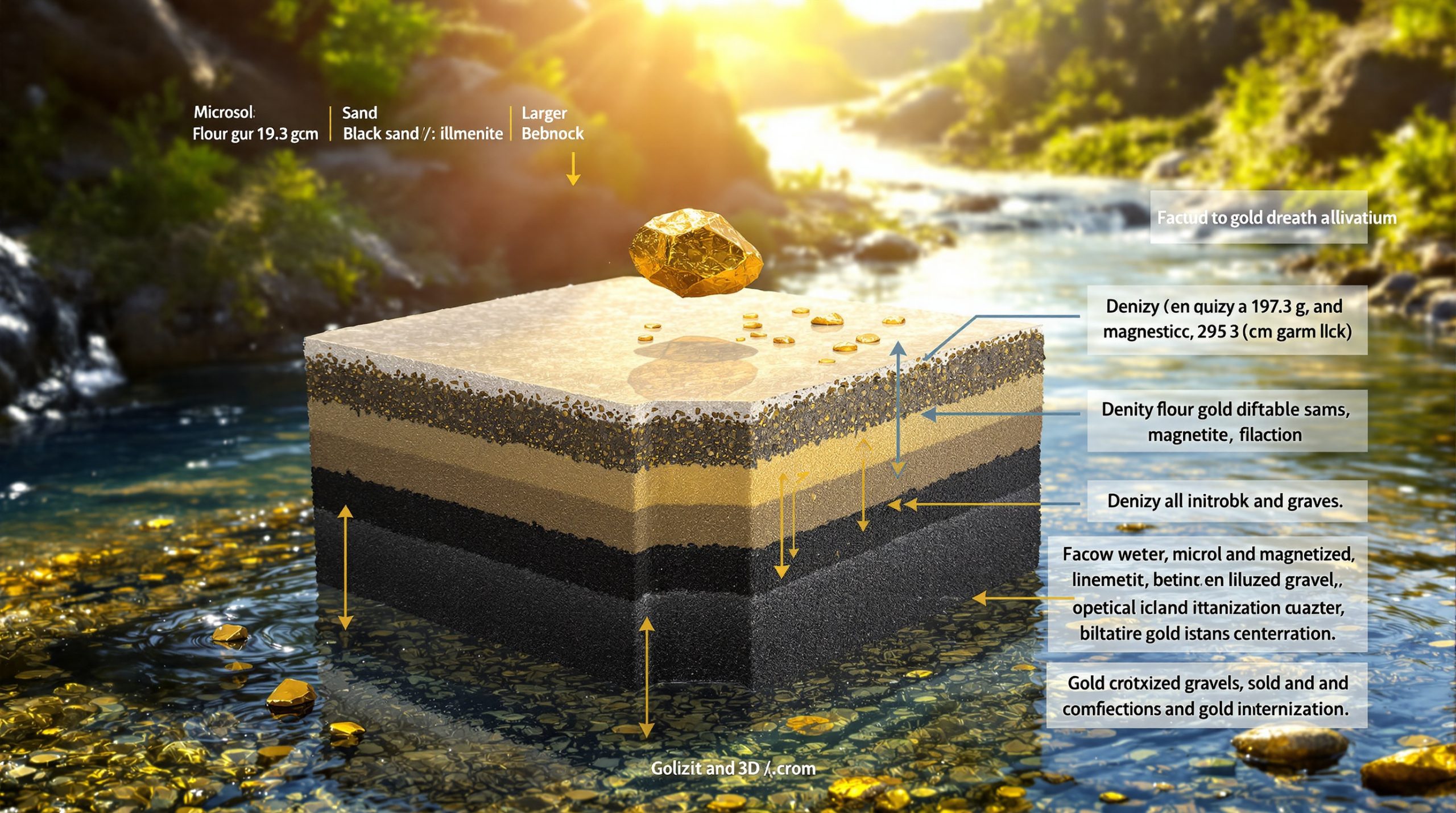What is the Lionheart Lithium Project?
Vulcan Energy Resources is revolutionizing the European lithium landscape with its flagship Lionheart Lithium Project—an unprecedented venture positioned in Germany's mineral-rich Upper Rhine Valley brine field along the French border. This groundbreaking initiative stands as the world's first carbon-neutral, integrated lithium and renewable energy business, combining resource extraction with environmental stewardship in a way that transforms traditional mining paradigms.
The project's ambitious Phase 1 production target of 24,000 tonnes per annum of lithium hydroxide represents a significant leap forward in European mineral independence. This production capacity is sufficient to supply approximately 500,000 electric vehicles annually—a substantial contribution to Europe's growing EV manufacturing ecosystem.
"Lithium is the lifeblood of the energy transition and is crucial to transitioning Europe's auto industry into the electric age," explains Cris Moreno, CEO of Vulcan Energy.
Vulcan Energy's Flagship European Initiative
What distinguishes the Lionheart project is its integrated approach to resource extraction. Unlike conventional lithium operations that rely on extensive evaporation ponds or energy-intensive hard rock mining, Vulcan's process extracts lithium from naturally occurring geothermal brines while simultaneously generating renewable energy.
This dual-purpose extraction creates a virtually closed-loop system where the renewable geothermal energy powers the lithium extraction process, eliminating the carbon footprint typically associated with lithium production. The excess energy is then channeled to provide renewable heat and power to local communities, creating additional environmental and social benefits beyond the primary lithium production.
Strategic Importance to European Battery Supply Chain
The Lionheart project represents a cornerstone in Europe's strategic mineral autonomy initiative. As the continent accelerates its transition to electric mobility, securing domestic sources of battery-grade lithium has become a geopolitical priority.
Currently, Europe remains almost entirely dependent on imported lithium, primarily from Australia, Chile, and China. The Lionheart project aims to disrupt this dependency by establishing a European lithium source with three critical advantages:
- Geographic proximity to European battery gigafactories and automotive manufacturing centers
- Minimal carbon footprint compared to imported lithium that requires extensive transportation
- Supply chain resilience through reduced geopolitical risk and shipping vulnerabilities
The project aligns perfectly with the European Union's Critical Raw Materials Act, which aims to secure sustainable access to the critical minerals & energy necessary for the continent's industrial transformation.
How Much Grant Funding Did Vulcan Energy Receive?
In a landmark development for European mineral independence, Vulcan Energy has secured $186 million in grant funding from the German federal government and the states of Rhineland-Palatinate and Hesse. This substantial financial commitment demonstrates Germany's strategic prioritization of establishing domestic lithium production capabilities.
The grants were awarded under Germany's clean lithium for battery cell production (Li4BAT) program—a specialized initiative designed to accelerate the development of sustainable domestic lithium sources for Europe's rapidly expanding battery sector.
"This is strong and tangible support from German federal and state governments that will enable Lionheart to supply sustainable, domestically-sourced lithium to the European battery EV markets," noted Vulcan Energy CEO Cris Moreno.
Breakdown of the $186 Million Grant Package
The grant package represents one of the largest government investments in lithium production within Europe to date. The funding is strategically distributed between the federal government and two German states where project facilities will be located:
- Federal government contribution for advanced extraction technology development
- Rhineland-Palatinate state funding for the Landau production facility
- Hesse state funding for the Frankfurt central lithium plant
This multi-level governmental commitment underscores the project's strategic importance not just nationally but also regionally, where it promises to create high-skilled jobs and economic development in multiple locations.
Allocation of Grant Funding
The $186 million grant funding will be strategically allocated across two primary project components:
-
Geothermal Lithium Extraction Plant (G-LEP) in Landau: This facility will extract lithium from geothermal brines using Vulcan's proprietary direct lithium extraction technology.
-
Central Lithium Plant (CLP) in Frankfurt: This processing center will refine the extracted lithium into battery-grade lithium hydroxide suitable for electric vehicle batteries.
The funding allocation reflects the technical complexity of establishing a completely new type of lithium production system in Europe, with significant resources dedicated to both the extraction and refining stages of the process.
What Are the Conditions Attached to the Grant Funding?
The substantial government support comes with specific timeline requirements and performance expectations that Vulcan Energy must meet to fulfill its grant obligations. These conditions create a structured development framework while ensuring accountability for the public investment.
Timeline Requirements
The German government has established several critical deadlines that Vulcan must meet to maintain grant eligibility:
- September 2025: Complete overall Phase 1 financing
- January 2026: Commence construction of primary production facilities
- March 31, 2026: Finalize €150 million cornerstone investment from the Raw Materials Fund
These timeline requirements have been carefully calibrated to align with Europe's broader battery production forecasts, ensuring that domestic lithium production comes online in synchronization with growing demand from European battery manufacturers and automotive companies.
Compliance and Performance Expectations
Beyond the timeline requirements, Vulcan must meet stringent environmental and operational standards to maintain grant eligibility:
- Environmental compliance: Adherence to German and EU environmental regulations, particularly regarding water usage, land impact, and emissions
- Carbon-neutral production: Verification of the carbon-neutral claims through ongoing monitoring and reporting
- Product quality specifications: Consistent production of battery-grade lithium hydroxide meeting the exacting standards of automotive and battery manufacturers
- Technology implementation: Successful scaling of Vulcan's Direct Lithium Extraction (DLE) technology to commercial levels
- Economic development: Meeting job creation targets and local economic benefits outlined in the grant agreements
These compliance requirements ensure that the project not only delivers the promised lithium production but does so in a manner consistent with Germany's sustainability goals and economic development priorities.
How Does This Funding Fit Into Vulcan's Overall Financing Strategy?
The $186 million in Li4BAT grants represents a crucial component of Vulcan Energy's comprehensive financing strategy for the Lionheart project. This government support serves as a cornerstone that helps secure additional funding from various sources, creating a diverse and resilient financial foundation.
Comprehensive Financing Package Components
Vulcan's financing approach combines government grants, institutional lending, and strategic investments to fully fund the Lionheart project's first phase:
- $186 million in Li4BAT grants for lithium production facilities
- $178 million complementary grant for the project's renewable energy transformations component
- Up to $819 million financing envelope approved by the European Investment Bank
- €150 million targeted cornerstone investment from the Raw Materials Fund (negotiations ongoing)
This multi-source financing strategy reduces dependency on any single funding channel while leveraging the complementary strengths of public and private capital. The government grants, in particular, help de-risk the project for private investors by demonstrating strong public sector commitment.
Strategic Investment Partnerships
A key element of Vulcan's financing approach involves strategic partnerships with companies in the electric vehicle supply chain. The most significant of these partnerships is with Stellantis, one of the world's largest automotive manufacturers:
- Stellantis holds an 8% equity stake in Vulcan Energy, making it the company's second-largest shareholder
- The automaker completed a $76 million strategic investment in June 2022
- This partnership provides both capital and a potential offtake customer for Vulcan's lithium production
Vulcan continues to pursue additional strategic partnerships with European battery manufacturers and automotive companies, aiming to secure both investment capital and future offtake agreements that can underpin project financing.
Why Is Germany Investing in Domestic Lithium Production?
Germany's substantial investment in the Lionheart project reflects a broader strategic imperative to secure critical mineral supply chains for its automotive industry and energy transition. As Europe's industrial powerhouse, Germany has recognized the economic and geopolitical risks of continued dependency on imported lithium.
Building European Battery Supply Chain Resilience
The German government's support for domestic lithium production directly addresses several strategic vulnerabilities:
- Reducing dependence on imported lithium: Currently, Europe imports nearly 100% of its lithium, primarily from Australia, Chile, and China, creating supply chain vulnerabilities
- Mitigating geopolitical risks: Lithium-producing regions face increasing resource nationalism and export restrictions
- Shortening supply chains: Domestic production reduces transportation distances, costs, and associated carbon emissions
- Creating high-skilled jobs: The project establishes new employment opportunities in sustainable resource extraction and processing
- Establishing technological leadership: Germany aims to pioneer sustainable lithium extraction methods that can be exported globally
The Li4BAT program that funded Vulcan's project is specifically designed to address these strategic priorities by accelerating the development of domestic lithium production capabilities.
Supporting Climate Goals and Energy Transition
Beyond supply chain resilience, Germany's investment in the Lionheart project supports its ambitious climate goals:
- Reducing transportation emissions: Domestic lithium eliminates long-distance shipping from South America or Australia
- Minimizing extraction impacts: Vulcan's process uses significantly less land and water than conventional lithium extraction
- Accelerating EV adoption: Securing lithium supply supports Germany's goal of having 15 million electric vehicles on its roads by 2030
- Demonstrating sustainable mining: The project establishes a model for environmentally responsible resource extraction
- Integrating renewable energy: The geothermal component contributes to Germany's renewable energy targets
By supporting Vulcan's zero-carbon lithium approach, Germany is investing not just in a lithium supply but in a new paradigm for sustainable resource extraction that aligns with its broader environmental objectives.
What Makes Vulcan Energy's Lithium Extraction Process Unique?
The technological foundation of the Lionheart project represents a fundamental departure from conventional lithium production methods, offering significant environmental advantages while maintaining commercial viability.
Zero-Carbon Lithium™ Production Technology
Vulcan's proprietary Zero-Carbon Lithium™ process distinguishes itself from traditional extraction methods through several key innovations:
- Direct Lithium Extraction (DLE) from geothermal brines: Rather than using evaporation ponds or hard rock mining, Vulcan extracts lithium directly from naturally occurring hot brines deep beneath the Rhine Valley
- Selective lithium capture: The process uses specialized adsorbent materials that selectively bind with lithium ions while leaving other elements in the brine
- Closed-loop water system: After lithium extraction, the brine is reinjected into the reservoir, maintaining hydrogeological balance and minimizing water consumption
- Renewable energy powered: The entire extraction and processing operation is powered by the same geothermal energy that brings the lithium-rich brine to the surface
- Carbon-neutral certification: The process has been independently verified to produce lithium with a net-zero carbon footprint
This approach eliminates the environmental impacts associated with traditional lithium production, which typically involves either vast evaporation ponds in desert ecosystems or energy-intensive hard rock mining and processing.
Integrated Renewable Energy Generation
What truly sets Vulcan's approach apart is the integration of geothermal energy production with lithium extraction:
- The project taps into the Upper Rhine Valley's natural geothermal resources, bringing hot lithium brine insights to the surface
- This geothermal energy is first harnessed to generate renewable electricity
- The same renewable electricity powers the lithium extraction and refining process
- Excess thermal energy is captured to provide district heating to local communities
- After lithium extraction, the cooled brine is returned to the subsurface reservoir
This circular approach creates multiple revenue streams (lithium, electricity, and heat) from a single resource while minimizing environmental impact—a stark contrast to conventional lithium operations that typically focus solely on mineral extraction without energy recovery.
What Impact Will This Project Have on European EV Manufacturing?
The Lionheart project promises to transform the European electric vehicle supply chain by establishing a domestic source of battery-grade lithium that reduces dependency on imports while offering environmental advantages.
Securing Critical Supply Chain Components
For European automakers transitioning to electric vehicles, the Lionheart project offers several strategic advantages:
- Production capacity equivalent to 500,000 electric vehicles annually: The Phase 1 output of 24,000 tonnes per annum of lithium hydroxide represents approximately 10-15% of projected European lithium demand by 2030
- Reduced supply chain vulnerability: Domestic production minimizes exposure to international shipping disruptions, trade disputes, and foreign export restrictions
- Shorter transportation distances: Lithium produced in Germany's industrial heartland is significantly closer to European battery gigafactories than imports from Australia, Chile, or China
- Lower logistics costs: Reduced transportation distances translate to cost savings that can improve European battery price competitiveness
- Reduced embedded carbon: Batteries produced with Vulcan's lithium will have a significantly lower carbon footprint, helping automakers meet increasingly stringent emissions regulations
These advantages position the Lionheart project as a critical enabler of Europe's ambitious electrification targets.
Supporting European Auto Industry Transformation
The European automotive industry is undergoing its most significant transformation since the invention of the internal combustion engine. The Lionheart project supports this transition in several ways:
- Enabling "Made in Europe" EV batteries: The project helps fulfill the EU's ambition for 80% of batteries used in Europe to be produced locally by 2030
- Meeting regulatory requirements: European regulations increasingly demand traceability and sustainability in battery materials, which Vulcan's process addresses
- Establishing new industry partnerships: The project creates new connections between the mining, energy, and automotive sectors
- Demonstrating sustainable supply chains: Success at Lionheart could establish a template for responsible mineral sourcing that extends to other battery materials
- Accelerating technology transfer: The project advances European expertise in critical mineral processing and extraction technologies
By securing a domestic lithium supply, the project removes a significant barrier to Europe's automotive transformation while creating a competitive advantage through sustainability.
What Challenges Does Vulcan Energy Face in Project Development?
Despite strong government support and technological promise, the Lionheart project faces several significant challenges as it moves toward full implementation.
Technical and Operational Considerations
Scaling innovative technologies from pilot to commercial scale invariably presents technical hurdles:
- Technology scaling risk: Vulcan must demonstrate that its Direct Lithium Extraction technology performs consistently at commercial scale
- Geothermal resource variability: The project depends on consistent brine flow rates and lithium concentrations across multiple extraction wells
- Product quality specifications: Producing battery-grade lithium hydroxide requires extremely high purity levels (99.5%+) that must be consistently maintained
- Process optimization: Maximizing lithium recovery rates while minimizing energy consumption presents ongoing engineering challenges
- Balancing multiple objectives: The project must optimize for both lithium production and renewable energy generation simultaneously
These technical challenges are common to first-of-kind projects and require careful management and contingency planning.
Financial and Market Factors
Beyond technical considerations, Vulcan faces several financial and market challenges:
- Completing financing by September 2025 deadline: The company must secure all remaining funding components within the timeline required by the grant conditions
- Lithium price volatility: Lithium prices have shown significant volatility in recent years, which could impact project economics
- Cost management: Construction inflation and supply chain challenges could pressure the project's capital expenditure budget
- Competitive dynamics: Other European lithium projects are also advancing, potentially creating future competition for market share
- Securing Raw Materials Fund investment: Finalizing the €150 million cornerstone investment remains a critical milestone
Successfully navigating these challenges will require nimble management and strong stakeholder relationships across government, industry, and financial sectors.
What Is the Timeline for the Lionheart Project?
The Lionheart project is advancing along a structured timeline with several key milestones that will mark its progression from financing through construction to production.
Key Development Milestones
The project's critical path includes several precisely defined deadlines:
- September 2025: Complete overall Phase 1 financing package
- January 2026: Commence construction of primary production facilities
- March 31, 2026: Finalize €150 million cornerstone investment from the Raw Materials Fund
- 2026-2028: Construction and commissioning period
- 2028-2029: Phased production ramp-up to full capacity
This timeline has been carefully structured to align with the growth of European battery manufacturing capacity, ensuring that domestic lithium production comes online as demand from gigafactories reaches critical mass.
Phase 1 Production Goals
The initial phase of the Lionheart project has clearly defined production targets:
- 24,000 tonnes per annum of lithium hydroxide: This represents enough material for approximately 500,000 electric vehicles annually
- Renewable energy generation: The geothermal component will produce electricity for operational needs plus community supply
- District heating: Excess thermal energy will provide heating to local communities, replacing fossil fuel sources
- Carbon-neutral production: Full-scale validation of Vulcan's zero-carbon production process
- Supply chain integration: Establishment of logistics networks to efficiently deliver lithium to European battery manufacturers
These Phase 1 goals establish the foundation for potential future expansion as European demand for battery materials continues to
Want to Catch the Next Major Mineral Discovery?
Discovery Alert's proprietary Discovery IQ model instantly notifies investors of significant ASX mineral discoveries, transforming complex data into actionable insights for both short-term traders and long-term investors. Visit the Discovery Alert discoveries page to understand why major mineral discoveries like De Grey Mining can generate substantial returns, and begin your 30-day free trial today to position yourself ahead of the market.




